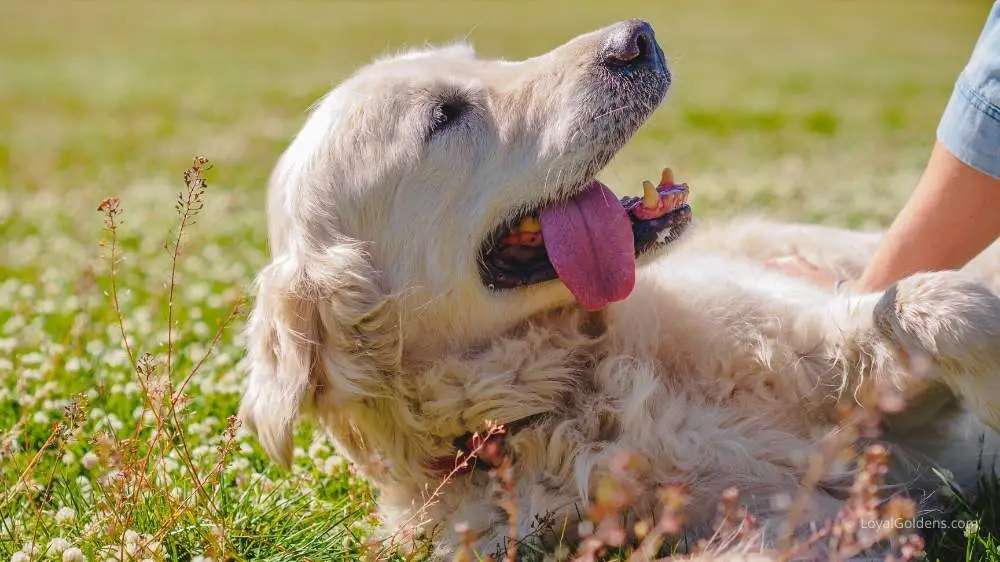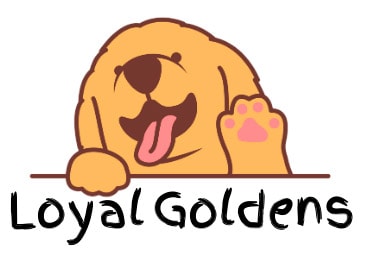Golden retrievers can be ticklish, although their reaction will differ from people’s. Golden’s show they enjoy being tickled by thumping their legs, wagging their tails, and scooting closer. Some retrievers enjoy being tickled more than others, though! Pay attention to your unique pup and what they like.
Read on to discover more about how Golden retrievers feel about being tickled.

(This article may contain affiliate links and loyalgoldens may earn a commission if a purchase is made.)
Unlock your goldens natural intelligence and see just how quickly problem behaviors disappear.This is the best at home dog training I've ever used!
What Do Tickles Feel Like For Golden Retrievers?
While we cannot know exactly how tickles feel for Golden retrievers, they often react as if they are having an itch scratched. If you have ever noticed your dog kicking one leg repeatedly into the air, they were probably experiencing the sensation of being tickled.
Scientifically speaking, tickling can happen in one of two ways. Dogs, however, only experience one of them!
Gargalesis (Laughter response)
Gargalesis involves repeated motion in a highly sensitive area, and it produces the type of laughs we are used to when being tickled!
When being tickled, dogs do not break out into laughter as humans do! So, Golden retrievers don’t experience this type of tickle response. Instead, we need to look for tickle responses in different ways.
Knismesis (Itching sensation)
Knismesis, on the other hand, differs from gargalesis because it includes very light tickles that can produce goosebumps and generally activate an itching feeling. When being tickled, dogs experience this kind of reflex!
Many animals experience knismesis, not just dogs. Knismesis often presents as an involuntary reflex, such as feeling part of the body that simply needs to be scratched. This means that if your Golden retriever repeatedly thumps their leg while you are providing tickles, they are probably experiencing the sensation of knismesis!
Are Golden Retrievers More Ticklish Than Other Dogs?
Although Golden Retrievers may not objectively be more ticklish than other dogs, we can examine what we know about the breed to learn more about their personality and responsiveness to tickling.
A Golden Retriever’s Personality May Make Them More Ticklish
According to the American Kennel Club, Golden retrievers enjoy having fun and act like puppies even when they become full-grown adults! They may appreciate playtime and tickles more than other dog breeds.
A Golden’s Love of Physical Affection (Equals More Ticklish?)
Golden retrievers, beloved for their sweet temperament, are also known for their affectionate behavior. Goldens typically love cuddling and being near their owners, so being tickled may be a more enjoyable experience for them than dogs that do not appreciate physical affection as much.
Although Golden retrievers typically embody this set of characteristics, every dog will react uniquely to all situations, including being tickled. So watch out for signs that your golden may not be in the mood for tickling and make sure to respect that!

Are Golden Retrivers More Ticklish Than People?
People can experience tickles in two different ways- gargalesis and knismesis, whereas our canine friends only experience the latter.
Golden retrievers will not laugh aloud like their human counterparts, but they still experience the tickling sensation that feels like an itch that needs to be scratched.
If we compare knismesis sensations between dogs and people, it’s unclear who ends up on top!
In all likelihood, it will depend on the person or Golden being tickled as each living creature is unique. Therefore, it’s entirely possible that some Golden retrievers can be more ticklish than your average person.
Do Golden Retrievers Like Being Tickled?
Golden retrievers, like their human counterparts, differ in their reactions to tickling. Some dogs enjoy it, and others do not. Additionally, Goldens may enjoy being tickled sometimes and not at other times. If you are tickling your dog, pay close attention to their reactions and respect your pup’s wishes.
How Do You Know If Your Golden Retriever Likes Being Tickled?
You can gauge how your Golden retriever feels about being tickled by looking for their reactions.
1. Tail wagging
Watch for your Golden retriever’s tail. If they happily wag their tail back and forth as they are being tickled, they are probably enjoying the experience! Feel free to keep looking for tickle spots that your Golden will respond well to.
If your pup expresses happiness by wagging their tail, scooting closer, or even smiling a bit, they probably enjoy a good tickling!
2. Ears
Keep an eye out for your Golden retriever’s ear behavior. If their ears appear to be tucked back, stretching their face, that might indicate that they feel uncomfortable. If their ears appear relaxed and forward, they may be in the mood for tickles.
3. Body position
Is your Golden retriever inching closer to you or laying on their backs, paws up and moving? If so, they may be appreciating your tickles and you should feel free to continue playing with them. However, if they scoot away or try to walk off, that should be an indicator that tickling does not interest them at that moment.
Where Are Golden Retrievers Ticklish?
If your Golden retriever enjoys being tickled, there are some tried-and-true spots that you can focus on to get that cute, leg-twitching behavior!
1. Paws
Golden retrievers, as well as most dogs, can be sensitive on their paws. If you gently look at the bottom of your pup’s paw, you will see the smooth pads of their feet with fur growing in between them. If you gently brush the fur on the bottom of their paws, many dogs will feel that tickling sensation and react well to the touch!
2. Bellies
Bellies are another popular tickle spot for canine friends. If a Golden retriever turns over onto their back and puts their paws in the air, take that as a sign that they enjoy belly scratches. If your Golden does not roll over or seems annoyed, they may not be in the mood for belly scratches.
3. Ears
Ears can be a sensitive spot for Golden retrievers. Rather than focusing on the light sensation of tickling, try gently rubbing and scratching your dog’s ear- often, they’ll lean into you to ask for more.
Just like people, a Golden’s ears can be sensitive, so make sure you pay attention to signs that your dog wants its ears left alone.
4. Neck
Think about the location of your canine friend’s neck. While Goldens can easily scratch many parts of their body with their hind legs, their neck can be a lot harder to reach! This means that human neck scratches can be a huge help to a Golden retriever that has an itchy neck!
For an extra treat, remove your dog’s collar and give them a gentle neck rub. While most Golden retrievers grow used to wearing a collar full-time, a collarless neck rub can sure feel amazing!
Discover how to train your Golden Retriever by playing games: 21 games to play with your Golden that will make them smarter and better behaved!
How Will a Golden Retriever React If They Are Being Tickled?
As mentioned before, some Golden retrievers enjoy being tickled, while others do not. If you have a pup who is experiencing knismesis (the kind of tickling that most animals experience), here are some signs you can look out for.
1. Tail wagging
We can usually deduce our Golden retriever’s attitude through their tail-wagging. According to VCA Animal Hospitals, the movement and speed of dog tails can communicate a huge amount of information.
For indication that your Golden feels happy and excited, look for a tail that is in a high or neutral position and is moving at a quick speed.
2. Head turning
Just like people will point their feet towards a situation they want to be in, a Golden retriever will turn their head towards you if they appreciate the attention they are receiving. If you are tickling them and they turn their body or face towards you, that’s a great sign!
3. Leg thumping
Finally, look for the classic leg-thumping behavior that indicates you found your Golden retriever’s “spot!” For this behavior, your Golden will kick their leg quickly midair as if they are scratching an itchy part of their body.
If you find a “spot” your dog strongly reacts to, take note and scratch that area again later! Most Golden retrievers will have some preferences of where they like to be tickled.
Final Thoughts
Golden retrievers experience tickling in different ways than people. For them, tickling often looks like a reflex that they can’t control.
Some pups enjoy being tickled, while others don’t. Pay attention to how they respond to tickles and adjust course if necessary.
Most Goldens have a few special spots where they enjoy being tickled, so take note of your specific dog and what they enjoy!
